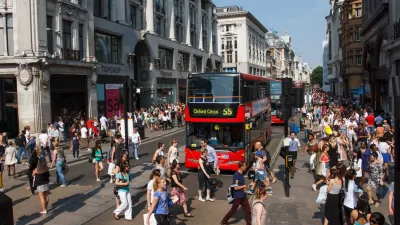The Economist
Growing Suburbs for the Good for the World
The Economist has published a pair of feature articles examining the growth of suburbs around the world in the hopes of avoiding the mistakes of the West.

Editorial: Streetcar Funding Better Spent Elsewhere
The Economist introduces the concept of the streetcar in America—its history and its recent revival—before laying the arguments in support of, and against, the role of streetcars in urban revival.
New Study Changes the Narrative on Slums
Researchers are building a more complete archive of life in slums, home to one-third of the urban population of developing countries. A new study from the Massachusetts Institute of Technology (MIT) rejects assumptions about the benefits of slums.
Should Britain Scrap its Green Belts to Build Houses?
Housing construction hasn't kept up with Britain's robust population growth. The Economist floats several ideas for spurring development: relax permissions for developing greenfields, incentivize building on brownfields, and tax the value of land.
Should Poland Preserve Its Communist Relics?
Many of Poland's older, iconic Communist buildings require major renovations and are seen as unwelcome reminders of a bygone time. But many people see them as historic landmarks that merit preservation.
Tale of Two Californias Misses the Bigger Story of Inequality
California's inequality is usually described in geographic terms that distinguishes between the state's affluent coastal areas and impoverished inland areas. When considering the cost of living, a statewide poverty crisis comes into focus.
England's Rust Belt Cities Struggle to Find Their Post-Industrial Footing
While London struggles with "supergentrification" and rising home prices, England's rust belt cities suffer from long-term decline and the withdraw of public spending. How can these places find their post-industrial footing?

Philly Swaps Squad Cars for Foot Patrols
Philadelphia's police force has increased the proportion of police on foot in its most violent neighborhoods. Not everyone likes the new presence, but the change has has achieved remarkable reductions in violent crime.
Melbourne Retains World's Highest Quality of Life
The Economist's Intelligence Unit has once again ranked Melbourne as the top city in its annual Global Liveability Ranking. Damascus has dropped to the bottom of the list due to Syria's ongoing civil war.
Urban Revival Drains Life out of London Suburbs
In an echo of the urban inversion confronting many of America's cities, London's phenomenal economic growth over the past decade has come at the expense of the city's suburbs, where unemployment and poverty are growing. Could this be a good thing?
Want to Avoid Detroit's Fate? Diversify Your Economy
"Nearly all the rich world’s industrial cities fell on hard times between 1950 and 1980," says The Economist. Why did some recover while others failed? A new paper argues that skilled workers and a diverse economy are key to overcoming adversity.
Britain's 'New Towns' Offer Lessons for Addressing Country's Housing Shortage
The mixed successes of Britain's post-war 'new town' and 'expanded town' developments offer some valuable lessons for those seeking to solve the country's acute housing shortage.

What's Driving London's Walking Boom?
London has always been a pedestrian-friendly city. But over the last decade the number of daily trips taken on foot in the city jumped by 12 percent, while walking declined nationwide. What explains the capital's pedestrian popularity?
Should the World Follow America's Lead and Raise Property Taxes?
Unlike the United Sates, Canada, and Great Britain, few countries raise substantial revenues from property taxes. The Economist argues that property taxes are among the most efficient, stable, and progressive forms of taxation and should be embraced.
Can America Adapt Its Waterfronts Before They Drown?
America's voracious appetite for waterfront development continues, even as a future filled with rising seas and extreme storms becomes more evident. The most proactive coastal areas have begun planing for adaptation, but are they doing enough?
Should Buses Be Free?
Mass demonstrations in Brazil over the past week were sparked by increases to bus fares. But what if buses were free? The Economist makes the argument that, to improve service and decrease congestion, we should study making buses and subways free.
'Handshake Buildings' Demonstrate Successes and Failures of China's Urbanization
The migrants that have swelled China's cities in recent decades still remain 'second-class citizens', unable to sell their rural land or have access to public services like schools or medical care. Will the country's new leaders change this?
China Subway Binge: Too Much Too Fast?
If plans by Chinese officials are followed, 38 cities across the country will have subway lines by the end of the decade. The Economist asks if that might be 20 too many, as shiny subways steer investment from other forms of transit.
Can an Upstart Mapmaker Beat Google and Microsoft at Their Own Game?
Glenn Fleishman profiles MapBox, whose 30 employees are taking on the big boys in the development of interactive street and satellite maps. The company is working with Charlie Loyd to develop "the most beautiful, clean map ever made."
The Forces Shaping London's Largest Redevelopment in 350 Years
At 195 hectares (480 acres), the Nine Elms redevelopment project being planned for the south bank of the Thames River will be "the most important regeneration story in London and in the UK over the next 20 years."
Pagination
City of Costa Mesa
Licking County
Barrett Planning Group LLC
HUD's Office of Policy Development and Research
Mpact Transit + Community
HUD's Office of Policy Development and Research
Tufts University, Department of Urban and Environmental Policy & Planning
City of Universal City TX
ULI Northwest Arkansas
Urban Design for Planners 1: Software Tools
This six-course series explores essential urban design concepts using open source software and equips planners with the tools they need to participate fully in the urban design process.
Planning for Universal Design
Learn the tools for implementing Universal Design in planning regulations.
































